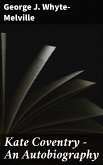In "Kate Coventry: An Autobiography," G. J. Whyte-Melville crafts a vivid narrative that immerses readers in the life and times of its titular character. The book is set against the backdrop of the Victorian era, showcasing the complexities of societal expectations and the personal struggles of women. Melville's literary style is marked by its engaging first-person perspective, rich descriptions, and sharp social commentary, blending elements of realism and sentimentality to bring Kate's experiences to life. The prose skillfully navigates themes of identity, agency, and the search for belonging, making this work not only a personal memoir but also a reflection of broader societal issues of the time. G. J. Whyte-Melville, a contemporary of the Victorian literary elite, was deeply influenced by his own experiences in hunting, country life, and the complexities of social structures. His background as an equestrian and landowner informed his keen observations of both rural and urban life, providing a unique lens through which he could portray a woman'Äôs perspective in a male-dominated society. As an author well-versed in the intricacies of character development, Melville sought to give voice to the inner lives of women'Äîa pioneering endeavor for his time. "Kate Coventry" is a compelling read that offers an insightful glimpse into the evolving role of women in the Victorian landscape. Readers who appreciate rich character development and historical context will find Melville'Äôs narrative both engaging and enlightening. This book invites reflection on the timeless struggles for self-definition and social place, making it a valuable read for anyone interested in feminist literature or the dynamics of 19th-century society.
Dieser Download kann aus rechtlichen Gründen nur mit Rechnungsadresse in A, B, BG, CY, CZ, D, DK, EW, E, FIN, F, GR, H, IRL, I, LT, L, LR, M, NL, PL, P, R, S, SLO, SK ausgeliefert werden.









